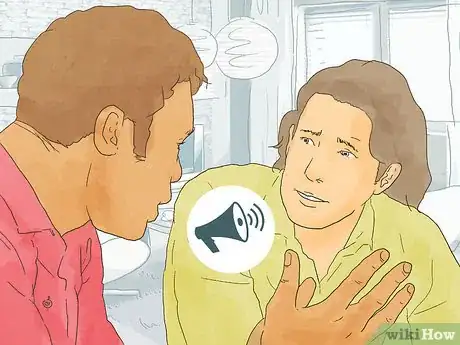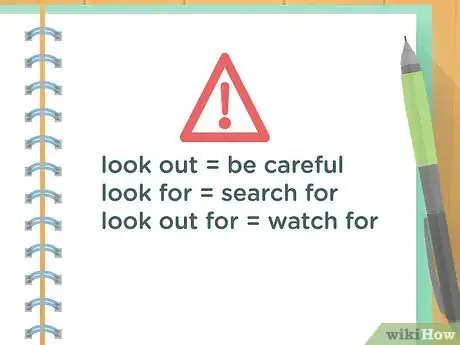X
wikiHow is a “wiki,” similar to Wikipedia, which means that many of our articles are co-written by multiple authors. To create this article, 56 people, some anonymous, worked to edit and improve it over time.
This article has been viewed 509,776 times.
Learn more...
Not all non-native speakers have trouble communicating in English. Many speak at a native level, but many do not. The ability to communicate with people who speak a limited amount of English is actually a skill that can be developed over time with practice. Whether you deal with non-native English speakers often or rarely, this advice will help you to communicate more effectively and smoothly.
Steps
-
1Speak clearly and pronounce your words correctly. Exaggerated pronunciations will not help your listener and may cause more confusion. However, you may find that it helps to pronounce some words as the non-native speaker does. This will be especially true if the proper pronunciation is very different from the non-native pronunciation.[1]
-
2Recognize that people wrongly think that turning up the volume somehow creates instant understanding. Avoid this common mistake. Yelling at the person doesn't make them understand. (However, do not speak too quietly).[2]Advertisement
-
3Do not cover or hide your mouth because listeners will want to watch you as you pronounce your words. This helps them figure out what you are saying in many cases.
-
4Do not use baby talk or incorrect English. This does not make you easier to understand. It will confuse your listener and may give the wrong impression about your own level of competence.
-
5Avoid running words together ( Do-ya wanna eat-a-pizza? ). One of the biggest challenges for listeners is knowing where one word ends and the next one begins. Give them a small pause between words if they seem to be struggling.
-
6When possible, opt for simple words instead of ones that are complex. The more basic a word is, the better the chance is that it will be understood. ("Big" is a better choice than "enormous" for example. "Make" is a better choice than "manufacture.") However, with a Romance language speaker (i.e. Spanish, French, Italian, Portuguese, Romanian), these 'complex' words can be useful as they are rooted in Latin.[3]
-
7Avoid verb phrases that sound very similar to non-native English speaker. "Look out" sounds very close to "look for." Both are similar to "look out for." Many times you can use another word in these cases. (Example: look out = be careful, look for = search for, look out for = watch for).
-
8As much as possible, avoid using filler and colloquialisms ('um...', 'like...','Yeah, totally.') as non-native speakers, especially ones of lower proficiency levels, may get hung up on these thinking the filler language is vocabulary that they don't possess. Colloquialisms are likely to be unknown as well, especially if they are not easy to find in the dictionary.
-
9If asked to repeat something, first repeat it as you said it the first time. Then again. It could be that they simply didn't hear you. If your listener still doesn't understand, however, change a few key words in the sentence. It may be that they couldn't understand one or two of the words. Also repeat the whole sentence and not just the last couple of words. It's time consuming, but it helps prevent confusion.
-
10Consider the fact that your dialect may not be what the other person has learned in school. For example, most non-Americans expect the second t in the word "twenty" to be pronounced.
-
11Paraphrase. if you happen to know a similar word to the word you are searching for then use it. As your knowledge of the foreign language builds this becomes even easier.[4]
-
12Avoid using contractions or short forms. Use long forms. “Can’t” is one word you must use the long form with. It is difficult for a non-native speaker to understand the difference between “can” and “can’t” in a sentence. For example, “I can’t take you on Friday” and “I can take you on Friday”. Use the long form, “cannot”. “I cannot take you on Friday”.
-
13Decrease the use of words that fill your sentences. The idea is to remove the “noise” from your speech. Imagine trying to listen to the radio with two young children in the same room. They are playing and screaming. What is the result? "Family of...car...on vacation...in Arizona." If your oral communication is filled with "um", "like", "you know", or other fillers, comprehension is more difficult. “Right” is a word that commonly fills conversations. It is better to use “Yes, that is correct”. A non-native speaker may not understand “right” and confuse it with its opposite, “left”.[5]
-
14Be explicit: Say “Yes” or “No”. Do not say: “Uh-huh” or “Uh-uh”. Those words are not in grammar books!
-
15Listen and try not to form your response while the other person is talking. Wait until the person is done so that you can clarify if needed and give correct information based on all they have said.[6]
-
16Be aware that other cultures have different standards regarding touching, eye contact and personal space. Someone standing too close or not looking you in the eye is merely following their own cultural standard and not trying to offend.
-
17Be patient and smile. The more relaxed you are, the more you are in control of your communication. Do not give a busy lifestyle or a meeting agenda permission to control your speech. Think as you speak and do not speak as you think.
-
18Don't shout. Unless it's really noisy, volume is not the issue; speaking louder won't help understanding and it may offend or embarrass.Yelling at them really doesn't help.
Advertisement
Community Q&A
-
QuestionWhat kind of equipment or aids can be used?
 Community AnswerCarry an English-to-native-language dictionary, or if you are really proficient in the language, get an English dictionary. If you have a cell phone, Google Translate is helpful.
Community AnswerCarry an English-to-native-language dictionary, or if you are really proficient in the language, get an English dictionary. If you have a cell phone, Google Translate is helpful. -
QuestionHow do I tell a person who speaks another language to speak clearly and slowly so that I can understand?
 Community AnswerSay something like "____ is not my first language. Could you please talk slowly so that I can understand better?"
Community AnswerSay something like "____ is not my first language. Could you please talk slowly so that I can understand better?" -
QuestionWhat conversations can I start with them?
 Community AnswerYou start the same conversations you would start with a native English speaker. Try using common icebreakers, such as the weather, or their hobbies.
Community AnswerYou start the same conversations you would start with a native English speaker. Try using common icebreakers, such as the weather, or their hobbies.
Advertisement
Warnings
- When there are words that sound the same but are spelled differently, write the word down to avoid confusion: 'bear' and 'bare' for example. If those two words are pronounced slightly differently in your accent, mention this.⧼thumbs_response⧽
- Don't try to talk down to them or speak in a fake foreign accent. It will annoy them and won't convey the message.⧼thumbs_response⧽
- Sometimes good communication means knowing when your skills are inadequate for a situation that demands precise communication. In these cases you will want a translator. For example, you wouldn't want to inadvertently send someone to wait in the wrong 3-hour line in a government office.⧼thumbs_response⧽
- Avoid touching listeners from some cultures. Even if you want to nudge them in the right direction or encourage them with a friendly pat on the back, your gesture may be misinterpreted. Many cultures view personal contact very differently and your friendly touch could be seen as aggressive or overly familiar.⧼thumbs_response⧽
- If you have a very heavy accent yourself (or one they are unfamiliar with) write the word down. Many non-English speakers actually have very good vocabulary and grammar basics, but the different accent can make things harder to understand.⧼thumbs_response⧽
- Don't agree to anything unless you are certain that you have communicated effectively. This could potentially be a serious issue. For example, if someone is asking which way to the hospital, you don't want to give them the wrong information.⧼thumbs_response⧽
- Unless you have been asked otherwise, avoid the temptation to correct your listener. Taking time to make corrections is useful if they have come to you asking for your help with their language skills, but otherwise it will slow down your communication and may cause your listener to feel self-conscious. Correction may also create a "teacher-student" relationship between you and the non-native speaker. You are not the teacher.⧼thumbs_response⧽
- When it comes to words that mean different things across different contexts, use a different word. Use 'final' and 'previous' instead of 'last', which can mean both. And explain the context of other people's usage of 'last' only when he/she can't work it out.⧼thumbs_response⧽
Advertisement
References
- ↑ https://www.psychologytoday.com/us/blog/communication-success/201911/do-you-talk-too-fast-how-to-slow-down
- ↑ https://www.fox13now.com/the-place/why-yelling-doesnt-work-as-discipline-and-what-parents-should-try-instead
- ↑ http://climb.pcc.edu/blog/improving-communication-with-non-native-english-coworkers-employees
- ↑ https://opentextbc.ca/introductiontopsychology/chapter/9-3-communicating-with-others-the-development-and-use-of-language/
- ↑ https://www.bbc.com/worklife/article/20161028-native-english-speakers-are-the-worlds-worst-communicators
- ↑ https://www.bbc.com/worklife/article/20161028-native-english-speakers-are-the-worlds-worst-communicators
About This Article
Advertisement













































































